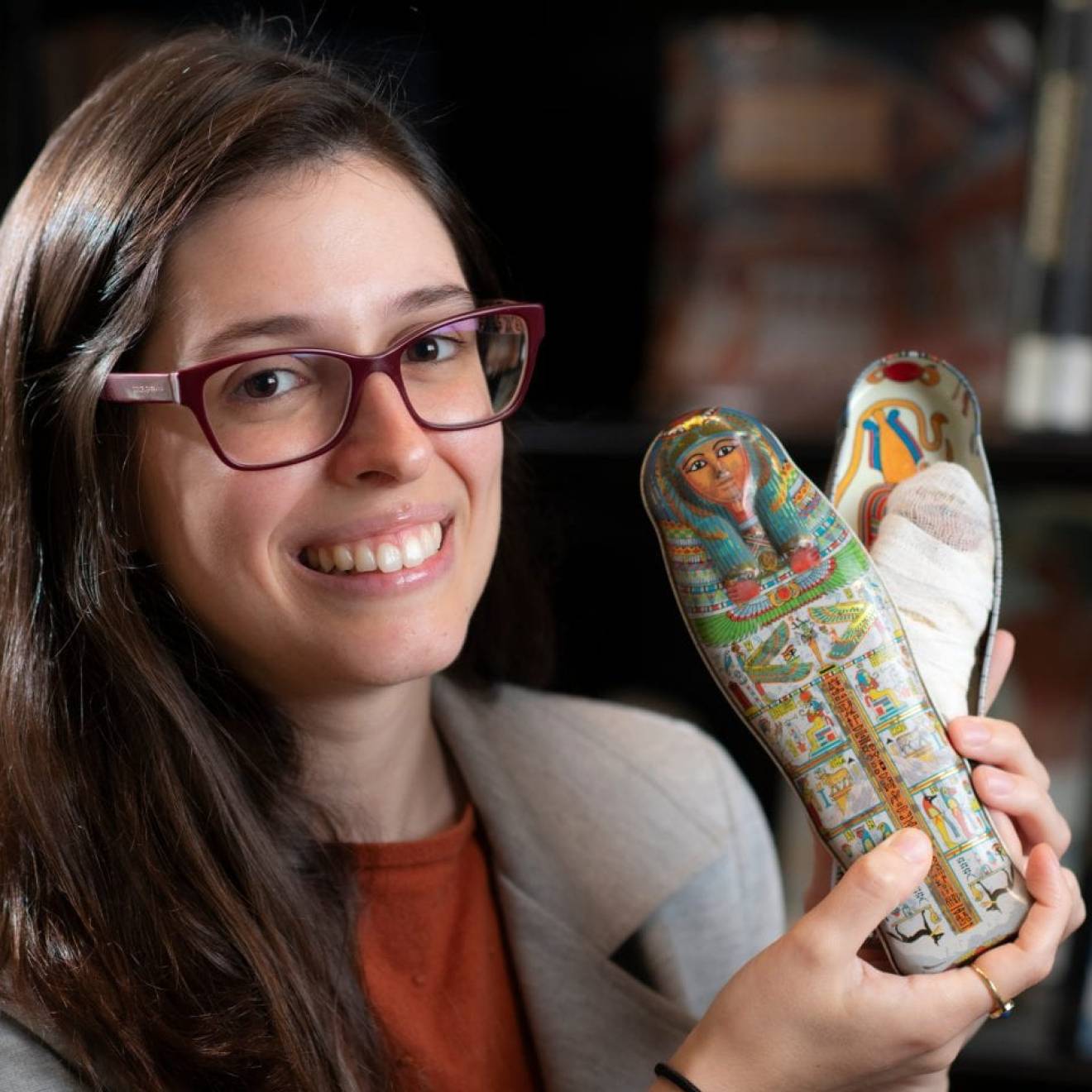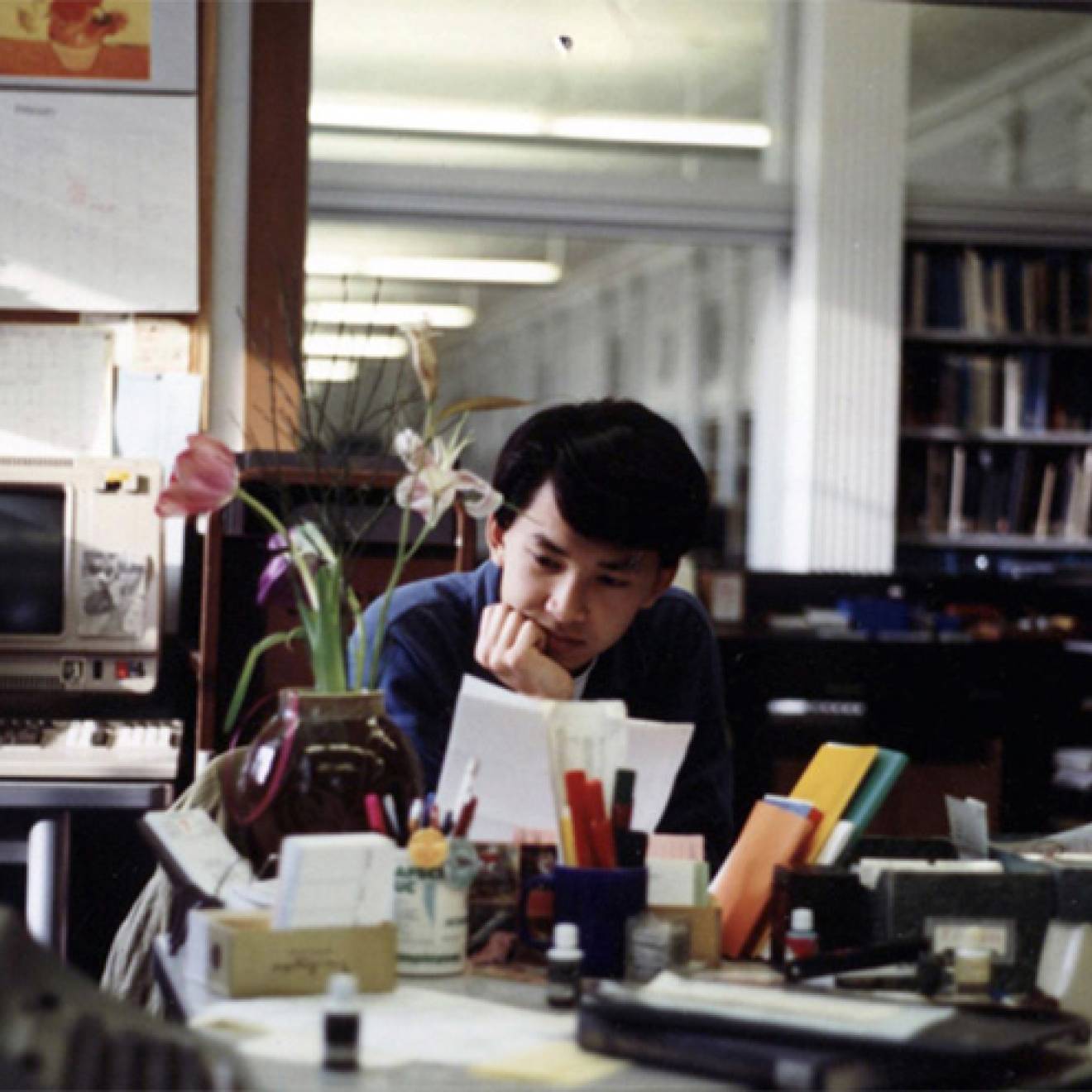Todd Schindler, UCLA
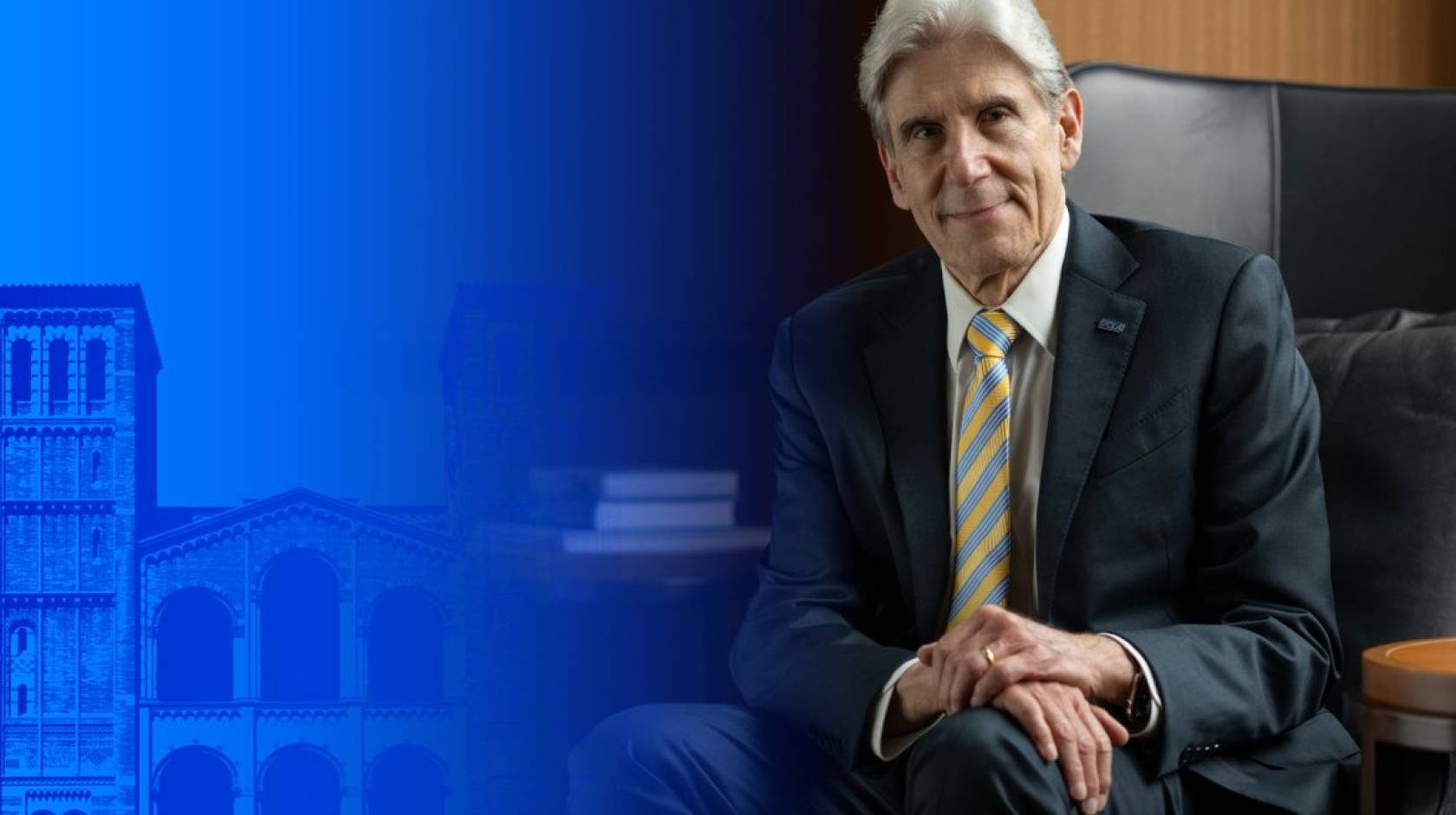
Dr. Julio Frenk, the president of the University of Miami and a leading global health researcher who has held positions in government and academia, both in the U.S. and in Mexico, will be UCLA’s next chancellor.
Frenk’s appointment was announced today by the University of California Board of Regents. He will begin his role as the campus’s seventh chancellor on Jan. 1, 2025.
Since 2015, Frenk has led the University of Miami, a private institution of more than 17,000 students. He previously served as dean of the Harvard T.H. Chan School of Public Health and as Mexico’s national health secretary.
“At this crucial moment for higher education, returning to the public sector to lead one of the top research universities in the world — including one of the 10 largest academic health systems — is an exciting opportunity and a great honor for me,” said Chancellor-designate Frenk. “I look forward to adding my lifelong commitment to public service in education and health care to the vibrant, diverse and cosmopolitan community that is Los Angeles.”
A champion of global public health and education
Through his leadership and scholarship, Frenk has made substantial contributions to the field of global health, impacting millions of lives.
A native of Mexico, Frenk served from 2000 to 2006 as Mexico’s secretary of health, during which he worked to reform the nation’s health system and launched Seguro Popular, an ambitious program to provide universal comprehensive health insurance. His efforts helped expand access to health care for more than 55 million uninsured people.
Previously, he was the founding director of Mexico’s National Institute of Public Health, one of the leading institutions of health education and research in the developing world.
Outside of government, Frenk worked as an executive director at the World Health Organization in charge of developing the scientific foundation for health policies around the globe and was executive vice president at the nonprofit Mexican Health Foundation. In 2008, just before going to Harvard University, he was a senior fellow with the Bill and Melinda Gates Foundation’s global health program, where he counseled the organization on global health issues and strategies.
In his nearly seven years as the dean of the Harvard T.H. Chan School of Public Health, Frenk was known for his interdisciplinary approach, his efforts toward educational reform and his strong fundraising — the school’s $350 million naming gift was the largest in Harvard’s history at that time.
During his tenure at the University of Miami, where he became president in August 2015, he achieved a dramatic turnaround of the university’s academic health system, drawing on the strengths of its Miller School of Medicine, and made strategic investments in educational innovation and interdisciplinary research. Frenk also successfully orchestrated a $2.5 billion centennial-centered fundraising campaign and oversaw the university’s induction as a member of the Association of American Universities — a testament to the breadth and quality of its research.
A transformative global leader, Frenk looks to advance UCLA’s tradition of engaged scholarship and global impact. He has said that as UCLA’s chancellor, he intends to continue to build on the groundwork UCLA has laid in areas like research, education, service to the local and global community, social justice, and diversity, access and inclusion.
“Dr. Frenk has demonstrated a powerful commitment to the health and well-being of people, institutions and systems around the world,” University of California President Michael Drake said. “His leadership will build on the growth and strength the campus has achieved under Chancellor Block and accelerate UCLA’s brilliant trajectory in service to Los Angeles, the nation and the world.”
At UCLA, Frenk will oversee an institution recognized worldwide as a powerhouse of excellence, opportunity and access. The university educates more than 48,000 undergraduate and graduate students every year through the UCLA College and 12 professional schools, features a world-class faculty of approximately 5,400, and operates five hospitals and more than 280 clinics offering primary and specialty care as part of the vast UCLA Health system. Through its wide-ranging scholarship, community engagement and service initiatives, and its position as the county’s fourth-largest employer, UCLA plays a vital role in Los Angeles, throughout the state and across the globe.
Frenk’s appointment marks the culmination of a seven-month international search by a 17-member committee that included Drake, UC regents and representatives of UCLA’s faculty, staff, students, alumni and foundation. The committee received extensive input from every sector of the Bruin community.
In the end, said Richard Leib, chair of the board of regents and a member of the search committee, it wasn’t just Frenk’s experience and qualifications but his thorough understanding of the crucial role of a large public research university in today’s world that made him the ideal choice to lead UCLA.
“It became clear to us that Julio has the vision and firmness of purpose to steer UCLA through this next era — resolute in his commitment to support faculty and educate the next generation to be global leaders while upholding the values of inclusivity and mutual respect,” Leib said.
Frenk said that with the challenges facing universities globally, safeguarding those values will be a top priority and that he intends to listen and work with the entire campus community to understand their needs.
“I do think that we’re at a critical moment in higher education. There has been an erosion of trust in institutions in general, including higher education institutions,” Frenk said. “The biggest challenge for us is to reaffirm our value to society — we have to constantly earn that trust. But the opportunity is huge.”
The way forward, he stressed, is to constantly advance the well-being of society through the pillars of education, research and service. This approach helps to create upward social mobility, advances knowledge and leads to solutions to society’s most pressing concerns, whether reducing inequalities or finding vaccines for COVID-19, he said.
Frenk will succeed Chancellor Gene Block, who announced last August that he would step down on July 31 after 17 years of leadership.
“Dr. Frenk is an excellent choice to take up UCLA’s chancellorship,” Block said in welcoming the chancellor-designate. “He is widely respected across academia and well known as an exceptional thinker, an administrator of considerable ability and a brilliant academic. UCLA is in great hands. I am certain that UCLA’s star will rise even higher under Julio.”
Prior to Frenk’s arrival in January, Darnell Hunt, UCLA’s executive vice chancellor and provost, will serve as interim chancellor. As UCLA’s chief academic and operating officer since 2022, he is uniquely positioned to lead the university through this period of transition. A dedicated leader on campus for more than two decades, Hunt has contributed his guidance and expertise to numerous UCLA and UC committees and has served as dean of social sciences, chair of the department of sociology, director of the Ralph J. Bunche Center for African American Studies, and as a professor of sociology and African American studies.
A commitment to inclusive excellence
The first Latino to lead UCLA in its 105-year history, Frenk recognizes that inclusive excellence — the guiding principle behind UCLA’s newly launched five-year strategic plan — is the linchpin to the university’s success as a public institution in one of the nation’s most diverse cities.
Today, nearly one-third of those who earn bachelor’s degrees from UCLA are the first in their families to do so. About one-quarter are transfer students, and roughly a third receive federal Pell Grants. Almost half of students attend tuition-free. The campus has made significant strides in recruiting and supporting both students and faculty from traditionally underrepresented groups, and Frenk said one of his major priorities is to continue to move the needle of diversity and social mobility in these areas.
At the University of Miami, a similarly global city, Frenk has championed what he calls a “culture of belonging” across the institution, where every individual — students, faculty and staff — is valued and has the opportunity to add value. Among his equity, diversity and inclusion–related initiatives was the opening of the Center for Global Black Studies, the creation of a new Office for Faculty Inclusion and Diversity, and the strengthening of the Office of Multicultural Student Affairs.
Frenk said his working experiences around the globe and his own background have given him a unique perspective on diversity.
“I consider myself a boundary spanner and a bridge builder,” he said. “And I know that the strength of institutions of higher learning — socially, academically and intellectually — comes from their diversity and from a willingness to cross boundaries.”
Julio Frenk and UCLA: A shared path toward success
Julio José Frenk was born in 1953 in Mexico City. In the 1930s, Frenk’s father, as a 6-year-old, left Germany for Mexico with his parents and sister to escape the growing climate of antisemitism. Frenk’s father, grandfather and great-grandfather were all physicians, as is one of his five sisters.
Frenk has said that, in many ways, his career as a physician and a public health expert has been a way of giving back to the country that saved his family. “All of us know that we owe our lives to the generosity of [Mexico], which then became our country,” he told Miami Magazine in 2015. “So I was brought up with the idea of the need to give back, almost a moral imperative to understand that sometimes it’s the generosity of strangers that gives you the chance to live.”
After receiving his medical degree from the National University of Mexico in 1979, he attended the University of Michigan, where he earned a master’s in public health in 1981, a master’s in sociology in 1982, and a joint doctorate in medical care organization and sociology in 1983.
In addition to being a highly regarded higher education administrator and distinguished global health expert, Frenk has been a professor of public health and sociology whose scholarship focuses on the functioning of health systems and the social and economic factors that determine why some people get sick. His research also examines the public policy implications of health transitions, the education of health professionals and global health governance.
Frenk co-chaired the influential Commission on the Education of Health Professionals for the 21st Century, launched by the medical journal the Lancet in 2010, which catalyzed major reforms in professional health education throughout the world. He has authored 196 papers in academic journals, 182 articles in cultural magazines and newspapers, and 29 books, including two bestselling novels for children that explain the functions of the human body. He is fluent in English, Spanish and French.
Frenk is an elected member of the U.S. National Academy of Medicine, Mexico’s National Academy of Medicine, the American Academy of Arts and Sciences, and El Colegio Nacional, Mexico’s most prestigious honorary society for scientists, artists and intellectuals. He was honored with the Clinton Global Citizen Award in 2008 for his service to humanity and for transforming “the way practitioners and policymakers across the world think about health.”
At Miami, Frenk has been described as a pragmatic consensus-builder, and he has focused on enhancing education, research, health care, innovation and intercollegiate athletics. As part of his efforts to strengthen his bond with the campus community, he wrote a column, “Frenkly Speaking,” for the student newspaper.
“On behalf of the faculty, I am delighted to extend a warm welcome to our next chancellor as we embark on this journey together,” said Andrea Kasko, chair of the UCLA Academic Senate. “We look forward to collaborating with Chancellor-designate Frenk to uphold our robust tradition of shared governance that ensures continued excellence in our academic mission, which defines our institution.”
Frenk’s leadership skills will serve him well as he takes the helm of a university that has experienced tremendous success and growth in recent years.
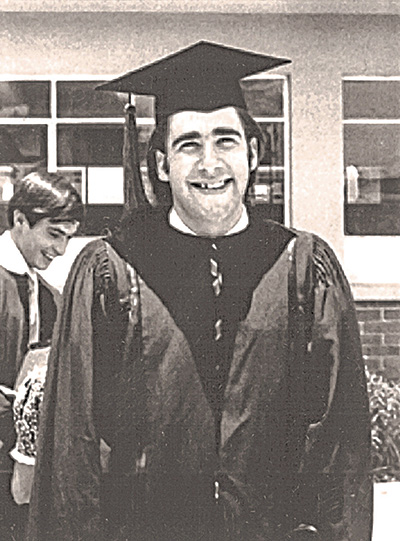
Frenk at his high school graduation in 1972.
Over the past two decades, UCLA student enrollment has increased by nearly 10,000 students, while the number of undergraduate applicants has skyrocketed from roughly 43,000 to more than 173,000 this year, cementing UCLA’s standing as the most applied-to university in the country for many years running.
External research funding has more than doubled to $1.7 billion annually, and an ambitious plan for the construction of student housing on campus and in Westwood has transformed the university from a commuter campus into a residential one, allowing UCLA to guarantee up to four years of university housing for incoming freshmen and two years for transfer students — the first and only UC campus to do so.
More recently, over a span of just 15 months culminating this January, UCLA expanded its footprint throughout Southern California with three historic acquisitions — UCLA South Bay, UCLA Downtown and the UCLA Research Park — that will enable it to serve more students, further strengthen its connection and commitment to the communities of Los Angeles, and advance scientific and technological research for the public good. While these expansion projects are in their early phases, Frenk said he relishes the opportunity to advance the initiatives.
And when it comes to research, he said he sees great opportunities for cross-campus collaboration that leverages the strength and expertise of schools, departments and units across the university.
“This is a time when we need bold innovation,” Frenk said, “And UCLA has a track record of embracing that type of innovation.”
The Frenk family and Los Angeles
In the course of his work in global health, Frenk met his wife, Felicia Knaul, a British-Canadian scholar who was conducting research on health system reform, in Mexico. Knaul is a globally recognized health economist who currently directs the Institute for Advanced Study of the Americas at the University of Miami and the Secretariat of the Hemispheric University Consortium, which supports the presidents of 14 leading universities in the Americas. She previously headed the Harvard Global Equity Initiative.
Knaul has been a faculty member at Harvard and Miami, has worked for leading international organizations, and has authored hundreds of journal papers and books on topics ranging from health system reform and cancer control to ending violence against women and children. Her personal experiences with breast cancer led to her founding of Cáncer de Mama: Tómatelo a Pecho, a Mexican nonprofit engaged in research and advocacy around women’s health.
Although much of Frenk’s time has been spent immersed in science, he said that music, art and literature have always played a big role in his life. He ends each day by reading fiction, alternating between books in English and Spanish.
“To me, the connection between science and the arts is the world I grew up in,” he said. “My mother was a classical concert pianist. Two of my sisters are professional musicians. My brother is a cosmologist. My grandmother was a writer and translator whose last job was as the curator at the Museum of Modern Art in Mexico.”
An opera fanatic — he calls it “a perfect art form” — Frenk said he’s excited to relocate to Los Angeles, where every day brings more to see and hear, not the least of which is produced and presented by UCLA.
“I’m impressed and inspired by the richness of the arts at UCLA, by the Hammer and Fowler museums and the arts schools themselves,” he said. “The university really provides such wealth for the city’s arts and music lovers.”
And having made athletics a pillar of his strategic plan at Miami, Frenk said he was enthusiastic about UCLA joining the Big 10 — but first he’ll have to learn to do the eight-clap.
“I am looking forward to the opportunities ahead,” he said. “Working together with the amazing students, faculty, staff and alumni, I am confident we will continue the university’s upward trajectory.”
President Drake also shared his excitement about UCLA’s future under Frenk.
“In addition to being one of the world’s great public research universities, UCLA is a vibrant, visionary institution whose scholarship is rooted in service — whether to the dynamic metropolis that surrounds it, or to the betterment of the planet,” he said. “Dr. Frenk’s academic achievements and global perspective make him a wonderful asset to help UCLA turn to a new chapter of its ever-growing excellence.”
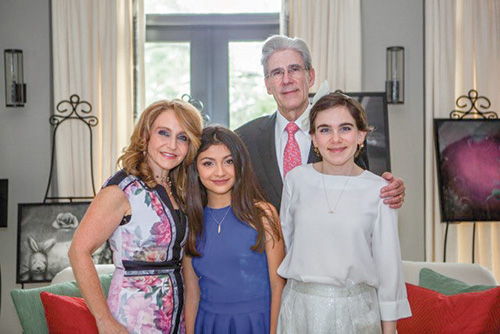
Frenk with his wife, Felicia Knaul, and two daughters.
